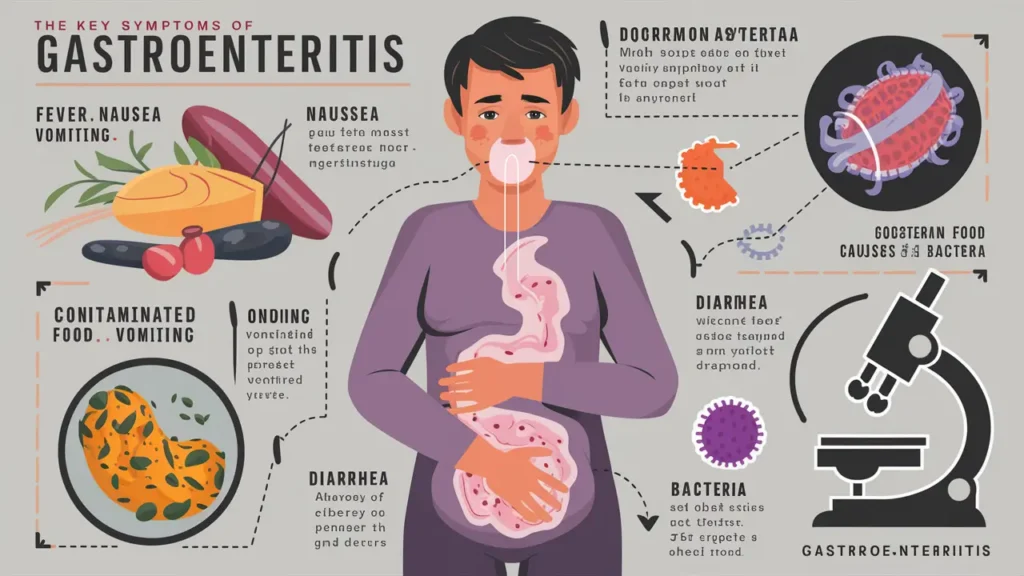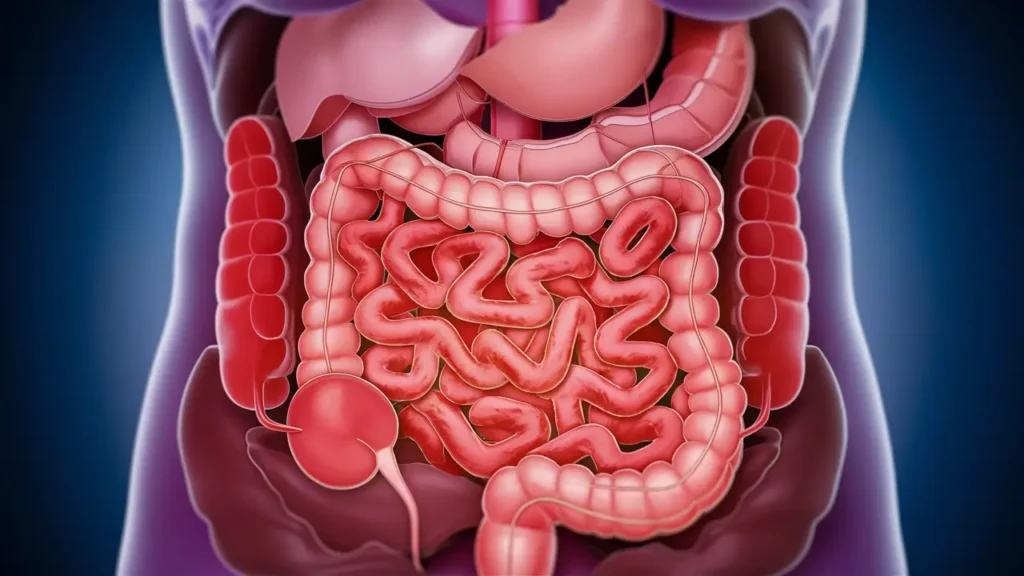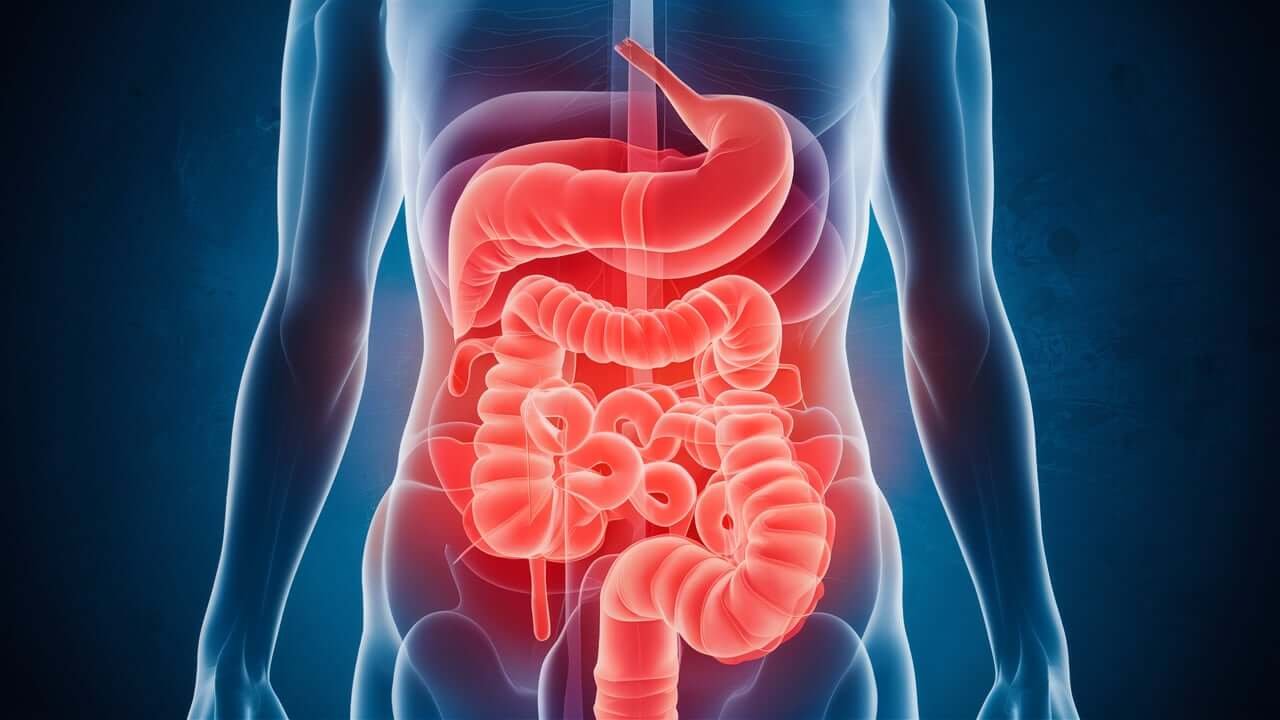wellhealthorganic.com: key signs of gastroenteritis
Gastroenteritis, better known as the stomach flu is an easily contracted digestive ailment that affects millions of people every year. Suffering from nausea, vomiting, diarrhoea, and abdominal cramps, it is a disease that brings substantial interference into the everyday functioning of an individual. It is something one needs to know its signs and symptoms so that necessary action can be taken to have it treated. This article presents revelation about one of the severest conditions, gastroenteritis: the cause, characteristic symptoms, the available treatment, and the ways of its prevention. From the specificity of its diagnosis to ways involving which it can be tackled in its early stages at home, this is a complete guide that will empower you with the knowledge that is required for dealing with gastroenteritis either basic or in-depth.
Understanding the Causes of Gastroenteritis
Gastroenteritis also known as the flu is mostly caused by viruses. But it can also be due to bacterial or parasitic infections for instance tuberculous pleural effusion will present with profuse bubbling and frothy pleural fluid compared to other infective causes of pleural effusion. Knowledge of the specific causes enables one to recommend preventive measures as well as treatment procedures for the condition.
Viral Causes:
- Norovirus: This is the most frequent reason for viral gastroenteritis; it often spreads very quickly in locations with large groups of people, such as schools, cruise ships, and nursing homes. All forms of norovirus usually present symptoms of illness that have a sudden onset, usually accompanied by vomiting and diarrhoea.
- Rotavirus: Another common viral that primarily affects infants and young children is rotavirus which is another cause of gastroenteritis. It is passed through physical contact with objects, equipment, or food and beverages that are contaminated.
- Other Viruses: However, they should also be aware that adenovirus and astrovirus are somehow less frequent, but they also lead to gastroenteritis and affect children and persons with a compromised immune system.
Bacterial Causes:
- Salmonella: Salmonella is bacterial parasites that are usually ingested through food and water and can lead to serious illnesses like gastroenteritis with features like fever, diarrhoea, and stomach aches.
- Escherichia coli (E. coli): Some types of E. coli especially E. coli O157 have been known to cause the synthesis of toxins that cause gastroenteritis. Conditions that lead to infections include the consumption of infected meats, especially if poorly cooked, or infected vegetables.
- Campylobacter: This bacterium is the leading cause of bacterial gastroenteritis across the globe with people getting infected from consuming poultry products or raw milk.
Parasitic Causes:
- Giardia lamblia: This is a parasitic disease that results from contaminated water and can lead to long-term effects which may include diarrhoea mainly in our stomach.
- Cryptosporidium: Like Giardia, Cryptosporidiosis is acquired through water oro-oral transmission or through animals, and produces acute gastroenteritis, primarily in immunocompromised patients.
Other Causes:
- Toxins: The toxins include staphylococcal enterotoxins from Staphylococcus aureus and Clostridial toxins from Clostridium perfringens eaten in foods that cause gastroenteritis in a few hours.
- Food Allergies or Intolerances: Some food allergies or intolerance cases like lactose intolerance or celiac disease may present with symptoms similar to gastroenteritis but are not contagious.
Key Symptoms of Gastroenteritis
Gastroenteritis is characterized by several symptoms that may worsen or improve, based on the origin of the disease and the patient’s condition. Knowing these changes can therefore be very useful in early identification of the decay condition and its management.

1. Diarrhea:
- Description: Diarrhea means the passing of loose or watery stools more than what is considered the normal frequency.
- Causes: Such as viral, bacterial, or parasitic infections; toxins that might be taken or ingested, some particular medication.
- Impact: This condition if not attended to can lead to dehydration of the tissues and organ systems.
2. Vomiting:
- Description: Act of vomiting where there is an exerted and rapid discharge through the mouth of the gastric contents.
- Causes: However, they can be acute viral gastroenteritis (Norwalk virus), bacterial (Salmonella), or toxins and food intolerance.
- Impact: If persistent it can cause bacterial infection and consequently lead to fluid loss and electrolyte imbalance.
3. Nausea:
- Description: Disturbance or sensation of discomfort in the stomach that is usually followed by vomiting.
- Causes: Inflammation as a result of invasion of the gastrointestinal tract mucosa by pathogens or toxins.
- Impact: This may lead to reduced appetite and subsequently lead to the formation of Debby if coupled with vomiting.
4. Abdominal Pain or Cramps:
- Description: Stabbing or gnawing sensations, that may be localized in the belly, and may be combined with cramping feelings.
- Causes: Spasm or twitching of muscles because of inflammation of the digestive organs or due to its irritation.
- Impact: May be as a simple discomfort to severe pain and restrains a person from performing his or her day-to-day activities.
5. Fever:
- Description: Body temperature higher than the normal range that is ranging usually 98. 6°F or 37°C.
- Causes: This is inappropriate for diarrheal diseases of bacterial origin such as Salmonella or Campylobacter or viral such as viral gastroenteritis.
- Impact: Suggests the body’s generalized reaction to an infection and may exacerbate the effects of dehydration if not well addressed.
6. Dehydration:
- Description: Dietary inadequate nutrition- Diarrhea, vomiting, poor fluid intake.
- Signs: Consequently, dryness of mouth, a decrease in the amount of urine produced or passing, increased thirst, dizziness, or tiredness may be witnessed.
- Impact: Acute kidney injury as a complication of dehydration is most concerning in those below 60 years of age and above 60 years.
7. Fatigue and Weakness:
- Description: Exhaustion; fatigue is a state that results from experiences of dehydration and electrolyte depletion.
- Causes: What effects does the long-term treatment of diarrhea and vomiting have on the nutrients and metabolism?
- Impact: Can interfere with daily life and/or the healing process.
8. Loss of Appetite:
- Description: Loss of appetite or aversion to food accompanied by lightheadedness or queasiness in the stomach.
- Causes: Primary effect on the gut through inflammation or any diseases affecting the body system.
- Impact: Failure to eat increases the length of the disease, and weakness becomes more intense.
9. Additional Symptoms in Children:
- Description: In addition to these symptoms children may also have signs of irritability, increased screaming, or decreased activity.
- Causes: The pediatric population is highly vulnerable to water loss and hence easily dehydrated because of their small body size and high metabolic rate.
- Impact: In children, the complication rate is very high, and hence early healthcare intervention is advised.
10. Duration and Progression:
- Description: The clinical signs usually start per-acutely and may persist for several days to as long as a week depending on the cause and the health status of the animal.
- Causes: In most cases, viral gastroenteritis presents acute symptoms and does not call for special treatment; bacterial or parasitic infections, on the other hand, will need professional management.
- Impact: This is in agreement with other researchers who have suggested that particular attention should be paid to symptoms, and the right care should be sought in order to minimize the risk of such complications in patients suffering from gastroenteritis.
How Gastroenteritis Affects Different Age Groups
Stomach flu or Gastroenteritis is an illness that individuals of all ages can contract, however, its effects and how it is treated, differ based on the age category of the patients. It is only through the appreciation of such variations that effort can be made to ensure proper forms of care and prevention-oriented to such needs as presented.
1. Infants and Young Children:
- Impact: Young children especially those below the age of five years should be protected from gastroenteritis because their immune system is still developing and also are highly susceptive to dehydration.
- Symptoms: They may consist of diarrhea, vomiting, high temperature, the tendency to be easily stressed, and less appetite.
- Management: It is advisable for patients to intake some fluids; oral rehydration solutions or ORS should be used because they help replace the fluids lost. If they are to persist or worsen then they would require a medical checkup.
2. School-aged children and Adolescents:
- Impact: Overall, school-going children and adolescents are comparatively more robust than younger children, but Gastroenteritis makes a significant impact in disturbing school-going activities of children.
- Symptoms: As in adults, recovery may be faster because of better immunity.
- Management: Just like the patient is advised to take plenty of fluids and to get an adequate amount of rest. Parents should also take caution in determining the child’s dehydration level in which they should consult a doctor if conditions become severe or persist.
3. Adults:
- Impact: Gastroenteritis in healthy adults is generally not severe and most symptoms are often manageable at home and the illness subsides in the span of several days to a week. However the symptoms are usually worse in elderly people or those with a weakened immune system.
- Symptoms: Some of the signs likely to be associated with children include; diarrhea, vomiting, abdominal pain, and fever. Clinical manifestation may be mild to extreme.
- Management: Most of the time, sleep, water, and over-the-counter drugs can be used to cure the disease. In cases of severe signs or if one is worried that they could be dehydrated, it is important for one to seek assistance from a doctor.
4. Pregnant Women:
- Impact: Flu during pregnancy can both dehydrate the mother and consequently the baby, as well as cause early labor.
- Symptoms: Like with adults, dehydration can be dangerous during pregnancy.
- Management: Pregnant women should drink water frequently; severe or permanent symptoms should be brought to the doctor’s attention.
Diagnosis of Gastroenteritis
Gastroenteritis diagnosis entails a differential approach where one will look at the symptoms establish a probable cause and then exclude other diseases with similar signs and symptoms. Although most patients with such complaints do not require certain diagnostic procedures, it is important to know certain conditions that may require a medical assessment.

1. Clinical Assessment:
- Symptoms Evaluation: Diagnosis is essentially made after a careful assessment of the patient’s clinical signs, which may include diarrhea, vomiting, abdominal pain, and fever.
- Medical History: Asking about trips and contact with other people, recent meals, and contact with people with similar symptoms is done to evaluate the possibility of infection.
- Physical Examination: Observing general symptoms in a patient like temperature, pulse rate, respiration, and blood pressure besides palpating the abdomen to determine point tenderness helps in determining how severe the patient’s condition is besides excluding other disorders.
2. Stool Tests:
- Purpose: Stool samples are collected to determine pathogen(s) that cause gastroenteritis; bacteria (e. g. Salmonella, Campylobacter), Viruses (e. g., norovirus, rotavirus), and/or parasites (e.g. Giardia, Cryptosporidium).
- Procedure: In this type, samples are taken to a lab with the purpose of finding out whether or not there are microbes or toxins present. Results dictate further actions in cases where the treatment may be required.
3. Blood Tests:
- Purpose: Additional investigations may be done to check the levels of electrolyte, renal function, and general bodily health especially when the condition is severe, or when dehydration is spotted.
- Markers: White blood cell count, which is raised with the sign of infection; the electrolyte level and signs of dehydration, such as blood urea nitrogen level, are assessed.
Treatment Options for Gastroenteritis
Gastroenteritis management therefore entails bringing relief of symptoms to patients, preventing dehydration, and treating the causative factor when present. Management strategies are based on the individuals’ symptoms, age, and specific microorganisms found to be present.
1. Hydration:
- Oral Rehydration: The patient should be encouraged to take fluids because of diarrhea and vomiting which eliminates water and electrolyte in the body.
- Oral Rehydration Solutions (ORS): These solutions have the right proportions of salts and sugars which is helpful in the expulsion of body electrolytes and water retention.
- Intravenous Fluids: Extreme cases may call for the administration of IV fluids, a condition that can only be handled in the hospital, much more if the patient is frail.
2. Dietary Adjustments:
- Clear Fluids: First of all, clear fluids like water, electrolyte-containing beverages like sports drinks, clear soup, and oral rehydration solutions can be taken.
- Gradual Introduction of Foods: If allowed, consumption of Bland, easily digestible meals (Bananas, Rice, Applesauce, Toast- BRAT diet) should be taken to enhance nutrient intake without worsening the condition.
3. Symptomatic Relief:
- Antiemetics: Other drugs such as ondansetron can be administered to manage nausea and to help control vomiting once it is chronic.
- Antidiarrheal Medications: That is why loperamide (Imodium) is used occasionally to decrease the frequency of diarrhea but is contraindicated in some cases of infections.
4. Antibiotics:
- Bacterial Infections: Antibiotics are used when gastroenteritis is caused by particular bacteria like Salmonella or Campylobacter and especially when severe or in special groups of patients.
- Parasitic Infections: Some cases of gastroenteritis may be a result of parasitic infections and hence antiparasitic drugs such as metronidazole for Giardia may be used.
5. Prevention of Spread:
- Hand Hygiene: Gastric outbreaks or gastroenteritis are minimized by washing the hands with soap and water after for instance using the bathroom, cleaning of baby’s diaper or even touching fecal contaminated objects.
- Food Safety: The common infections that result in gastroenteritis may be avoided if the food is properly prepared, cooked, and stored properly.
- Isolation Precautions: Most people with the infection need to be quarantined and the surfaces and objects contaminated with the virus need to be sanitized.
6. Medical Monitoring and Follow-Up:
- Monitoring: Healthcare providers may suggest particular visits or appointments after a certain period to check the hydration level, the signs, as well as the healing process.
- Complications: It is essential to watch for signs of the complication for example dehydration, electrolyte imbalance or secondary infection especially in special groups of patients.
The goal of treating gastroenteritis is to manage the signs and symptoms seen, prevent complications such as dehydration, and properly manage the course of the illness. Delivering treatment according to the cause and coexisting medical condition improves the result and minimizes the effects of gastroenteritis in life. Consultation with a health care practitioner is recommended in cases of worsening symptoms, inability to stop vomiting, presence of fever, and or any sign of dehydration or severe manifestations.
Preventive Measures for Gastroenteritis
In order to prevent gastroenteritis or acute diarrheal disease, people should practice good personal hygiene, food hygiene, and safety, as well as using appropriate precautions especially while in such vulnerable places as health facilities and schools, or places with congested persons. These measures will help prevent one from contracting or transmitting gastroenteritis thus improving one’s health status.

1. Hand Hygiene:
- Regular Handwashing: Soap and water should be used to clean the hands frequently and this includes; after using the washroom, after handling diapers, and before handling or preparing food.
- Alcohol-Based Hand Sanitizers: If hand washing with soap and water is not achievable, wash with hand sanitizers with at least 60% alcohol, but this kills certain pathogenic microorganisms.
2. Food Safety Practices:
- Proper Food Handling: The preparation surfaces, utensils, and even the hands of the operator should therefore be cleaned prior to preparing the food. Preparing and cooking meats, especially chicken, fish and eggs should be done thoroughly to the recommended temperatures to eliminate the bacteria.
- Safe Storage: Store delegacy foods and other easily spoiling foods in the refrigerator immediately, and at an appropriately low temperature, preferably below forty degrees Fahrenheit or four degrees Celsius.
- Avoid Cross-Contamination: Raw meats must be stored and prepared in a different place where the ready-to-eat foods are and should use different knives and chopping boards.
3. Water Safety:
- Safe Drinking Water: Though contagious waterborne diseases have turned out to be rampant, ensure you take clean, safe water only from approved sources. Water should also be boiled before drinking or otherwise purified if the quality of tap water is in doubt; if possible, use bottled water instead.
- Avoid Contaminated Water: Do not take water into the mouth when swimming in pools, lakes, or rivers; they contain germs.
4. Vaccination:
- Rotavirus Vaccine: Vaccination of infants with rotavirus has been recommended to reduce severe gastroenteritis which is due to rotavirus, a well-known diarrhea-causing virus in children below five years of age.
- Other Vaccines: Prophylaxis against certain disease-causing agents (for instance Hepatitis A) may be advised in the travel or with persons with higher risk of contact.
5. Environmental Hygiene:
- Public Health Measures: This can be achieved through the following measures; practicing infection control measures within healthcare facilities, schools as well and daycare centers so as to reduce the incidences of gastroenteritis.
- Isolation Precautions: Quarantine should be made for persons who have diarrhea and vomiting since this leads to the spread of more cases mainly to other patients in the facility.
6. Travel Precautions:
- Safe Eating and Drinking: In regions with inadequate water hygiene, drink water that is packed or water that has been boiled, and consume food that is well cooked and served hot.
- Hand Hygiene: Swallow less water and saliva when moving around, or when sitting in a moving car to prevent stomach bugs when traveling.
8. Community Awareness and Education:
- Promote Hygiene Practices: Sensitize the public on the aspects of proper hand washing practices, proper handling of foods, and vaccination to avoid cases of gastroenteritis.
- Health Promotion Campaigns: Carry out awareness creation on ways of avoiding gastroenteritis and its prevention among the public especially in schools, workplaces, and other public places.
9. Personal Responsibility:
- Self-Monitoring: People should also be observant of their sickness and consult their physician once they get signs of gastroenteritis or when the sickness lasts long.
- Healthy Lifestyle: Thus, it is essential to eat healthy and exercise daily, as well as to know how to deal with stressful situations in order to strengthen immunity and become less vulnerable to infections.
Complications of Gastroenteritis
Most patients with acute gastroenteritis recover without complications, but specific misery or certain pathogens increase the risk of sickness. Knowledge of potential complications with regard to gastroenteritis assists in the assessment of conditions in which medical treatment is required and ways of reducing risk.
1. Dehydration:
- Description: Explain dehydration, it happens in the body when the body loses more fluids than it absorbs and this is mostly by vomiting and diarrhea.
- Signs: Less frequent or dark yellow colored urine, dry and sticky mouth, tempting urge to drink excessive amounts of water, dizziness.
- Impact: Dehydration can become life-threatening if it results in an insufficiency of electrolytes, liver or kidney failure & in severe cases even death, if untreated by replacing fluids & electrolytes.
2. Electrolyte Imbalance:
- Description: Dehydration through emesis and/or diarrhea with resultant loss of electrolytes such as sodium, potassium, and chloride.
- Signs: A person who experiences this condition may experience muscle weakness, irregular heartbeat, confusion, and neurological signs.
- Impact: Serum electrolyte abnormalities can lead to dysfunction of vital organs and therefore, should be corrected by replacing the lost electrolytes either orally using ORS or by IV.
3. Malnutrition and Nutrient Deficiencies:
- Description: Chronic or severe diarrheal diseases may affect nutritional status and can result in deficiency even in those who are not malnourished in the first place, especially in children and the elderly.
- Signs: Tiredness and general body weakness associated with poor appetite and weight loss as well as slow recovery.
- Impact: If a child is malnourished long-term problems like weak immunity, lengthened recovery time, and the like are eminent.
4. Secondary Infections:
- Description: It reduces the body’s immunity hence putting an individual at a higher risk of being infected by a secondary bacterial or viral infection.
- Examples: Pneumonia, a UTI, or skin infection Possibly, they had pneumonia or a UTI or some other skin infection.
- Impact: Superinfections threaten patients’ condition and often demand additional treatment, such as antibiotics.
5. Intestinal Damage:
- Description: Some strains of bacteria or parasites can cause inflammation and damage of the mucosa of the small bowel and this is seen in severe cases of gastroenteritis.
- Signs: Abdominal pain, that persists; bloody diarrhea; fever.
- Impact: Inflammation and damage may need certain medication such as antibiotics or antiparasitic for the condition to improve and avoid dangers such as intestinal perforation.
6. Long-Term Gastrointestinal Issues:
- Description: After the acute phase of gastroenteritis some people can have chronic gastrointestinal problems like chronic diarrhea, abdominal pain, or IBS.
- Signs: Discomfort or disease of the gastrointestinal tract that is periodic or chronic in nature and impacts the patient’s well-being.
- Impact: Treatment might therefore ensue in terms of changes in diet, drugs, and regular medical consultations to relieve instances of discomfort.
7. Psychological Impact:
- Description: Hospitalization or chronic illness, flare-ups, or other resulting complications that seem unrelated to gastroenteritis may cause stress, anxiety, or Post-Traumatic Stress Disorder, especially in more sensitive persons.
- Support: Sometimes, the patient might require guidance through a psychologist or a mental health expert for preventive purposes to help with social and mental problems.
Conclusion
Therefore, to echo the introduction, one can conclude that, although gastroenteritis is, for the most part, a transient condition, it is a pathogen that carries a non-negligible risk to the health of certain subpopulations of the population, whether it is pediatric, elderly, or immunocompromised populations. It is noble to understand the symptoms, preventions, and complications enumerated in this article and prevent their devastating effects.
Through proper washing, proper storing, consulting a doctor when feeling unwell, and carrying out proper home care such as supporting care for the sick, the effects of gastroenteritis can be prevented. Regardless of a person’s demographic background, knowledge of the symptoms of dehydration, electrolyte disturbances, and the potential adverse effects frequently makes patient-initiated actions necessary. Finally, given the importance of gastroenteritis among the population and the burden that societies carry regarding this disease, public health education and overall compliance with preventive measures are the most significant roles within the gastroenteritis reduction process.







